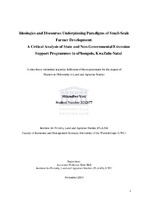| dc.description.abstract | As a means to reduce poverty particularly in rural areas, the South African government has placed great emphasis on the development of small-scale farmers into becoming commercial farmers. Central to this effort is the provision of agricultural extension support, as reflected in the 1995 White Paper on Agriculture (DOA, 1995), African National Congress (ANC) policy resolutions of 2007 (ANC, 2007) and a 2011 extension recovery plan (DAFF, 2011). Parallel to this policy process, a growing role of nongovernmental organisations (NGOs) in supporting small-scale farmers, and criticising the governmental approach is observed. Biowatch is one example of this kind of NGO that, aside from its direct support to
farmers, advocates for an alternative approach that embraces ‘subsistence’ farming. The academic literature suggests that existing agricultural policies are too generic and therefore fail to accommodate the different types of small-scale farmers that are found in rural areas, resulting in poor policy impact. This thesis seeks to establish the ideological thinking underpinning two paradigms of small-scale farmer development in South Africa and explores what they look like in practice, while analysing how they produce and reproduce class differentiation, and the emergence of various livelihood trajectories. Through qualitative research conducted in one case study site (the village Emagengeni in Northern KwaZulu-
Natal) the views of farmers (beneficiaries of extension support as well as non-receivers) have been elicited and so contribute to a clear picture of what is happening there. In addition, experiences and perceptions of government extension officers, provincial officials and a Biowatch official are taken into
account. Theoretically, the study is framed using Cousins’ (2011) class analytical perspectives on smallscale farming in South Africa which distinguish between three types of ‘petty commodity producers’, i.e. (i) petty commodity producers that produce to meet most of their social reproduction needs, (ii) petty commodity producers producing to partially meet their social reproduction needs and (iii) petty
commodity producers producing enough to sell and make profit and start to accumulate capital. In addition, the categories described by Dorward et al (2009) in the ‘stepping up’, ‘hanging in’ ‘stepping out’ and ‘dropping out’ theory, are used to analyse the broad types of strategies pursued by poor people. The sustainable livelihoods framework is used to classify the various types of farming households
observed. The main argument is that since 1994 the nature of public agricultural support has not met the needs of the majority of farmers in the country, i.e. poorly resourced farmers mostly located in the former homelands. This is because it is trying to make them into something they are not, i.e. commercial farmers
and is focused on on-farm productivity and does not address wider market conditions. Although Biowatch demonstrates a more effective response to farmers’ needs, it is limited in its approach to agrarian transformation. The conclusion is that government’s fixation on the commercialisation of small-scale farmers perpetuates the existing and already problematic dualism within the agricultural sector. | en_US |

